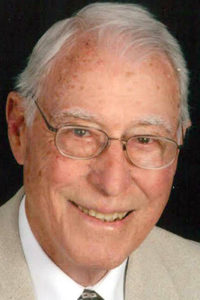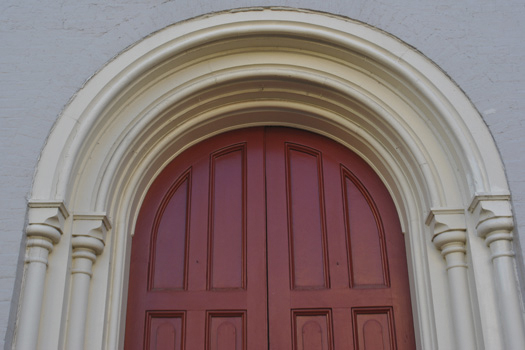
Pete was a northerner from Long Island who came to St. George’s some 60 years ago in 1956 before he was 30 years old. He carried with him from New York a love of the sea and owned several boats in his life time. He journeyed to Richmond early in his career where he sold insurance and worshipped at St. Paul’s, singing in the choir. When he moved to Fredericksburg according to Pete, the first thing he looked for was an Episcopal church. He continued his work in the insurance business.
At St. George’s he served seven terms on the Vestry, a record in the period after World War II when there were term limits. He served in five different decades, another record and 5 times as Senior Warden, yet another record:
Years on Vestry
|
1958-1960 |
1st term |
|
1962-1964 |
2nd term Senior Warden 1964 |
|
1966-1968 |
3rd term Senior Warden 1966, 1967, 1968 |
|
1970-1972 |
4th term |
|
1978-1980 |
5th term |
|
1986-1988 |
6th term Senior Warden 1987 |
|
1991-1993 |
7th term |
He sang in the choir and had a lovely baritone voice. He was very distinguished, like a priest – in fact he served many times as crucifer in funerals.
In recent times when I came to St. George’s he helped us count money on Mondays. Pete usually had a jovial countenance, a smile on his face but there were times when procedures weren’t followed that he could get very disgusted . He was a man who followed the rules – whether in insurance or in church. He expected others to do so, too.
Pete was always one to ask about St. George’s history. More than once he led to good stories – when they moved the graves out of the way of the construction of McGuire and Edward McGuire’s was accidentally opened. (He said the smell was unbelievable). He also led to research an event in the last 1960’s when the issue of women on the Vestry first arose.
Here’s the story that Pete alluded to that I wrote about in October, 2008:
“The annual St. George’s congregational meeting began innocuously on January 24, 1966 with a cover dish meal followed by a meeting with “about a hundred persons present” an hour later. Votes were collected to elect the 1966 Vestry and while the counting was progressing, various reports were presented, typical during congregational meetings. Mrs. Carroll Quenzel, president of the St George’s Churchwomen (precursor for the ECW), finished her speech and was given a standing ovation. She had ended her speech with the following: “My only regret is that some of our women are not more active.” That was a hint of things to come.
“After a speech by Rector Tom Faulkner, recognizing the accomplishments of various St. Georgians, the following was recorded in the newsletter: “The air of happy spontaneous enthusiasm and agreement which had pervaded the meeting was broken momentarily when Dr. Carrol H. Quenzel, at the call for new business, moved that women have the privilege of serving on the vestry. His motion was seconded and he spoke in support of it. Then “sparks flew” on both sides and some families split on the vote which found 25 in favor of it, 41 against, 29 abstaining.”
“A few words about Quenzel are in order. Quenzel was the librarian at Mary Washington College at a time when it was only a female institution. Obviously, he could see the potential of women leadership at the college. Pete Myers who was at the congregational meeting remembers Quenzel as somewhat of an eccentric who would go to barbecues in his best clothes and abruptly hang up the phone when he was through talking. Betty Stephens worked for him in her first job and remembers as a very kind person but may have been “a closet liberal.” Quenzel is known for authoring the history of the Church published in 1951. Tom Faulkner III remembers his many roles in the Church and called him a “rock” of St. George’s.
“Quenzel’s unsuccessful moment may have been more successful than perceived. By February, 1968 Avis Harris had taken her seat as one of the “vestrymen”. While women served, many customs from the past remained. It was not until 1978 that “vestrypersons” replaced the term “vestrymen” in the minutes. Incidentally, I could find no record in the archives of the Vestry taking a position of admitting women to the men’s club.”
